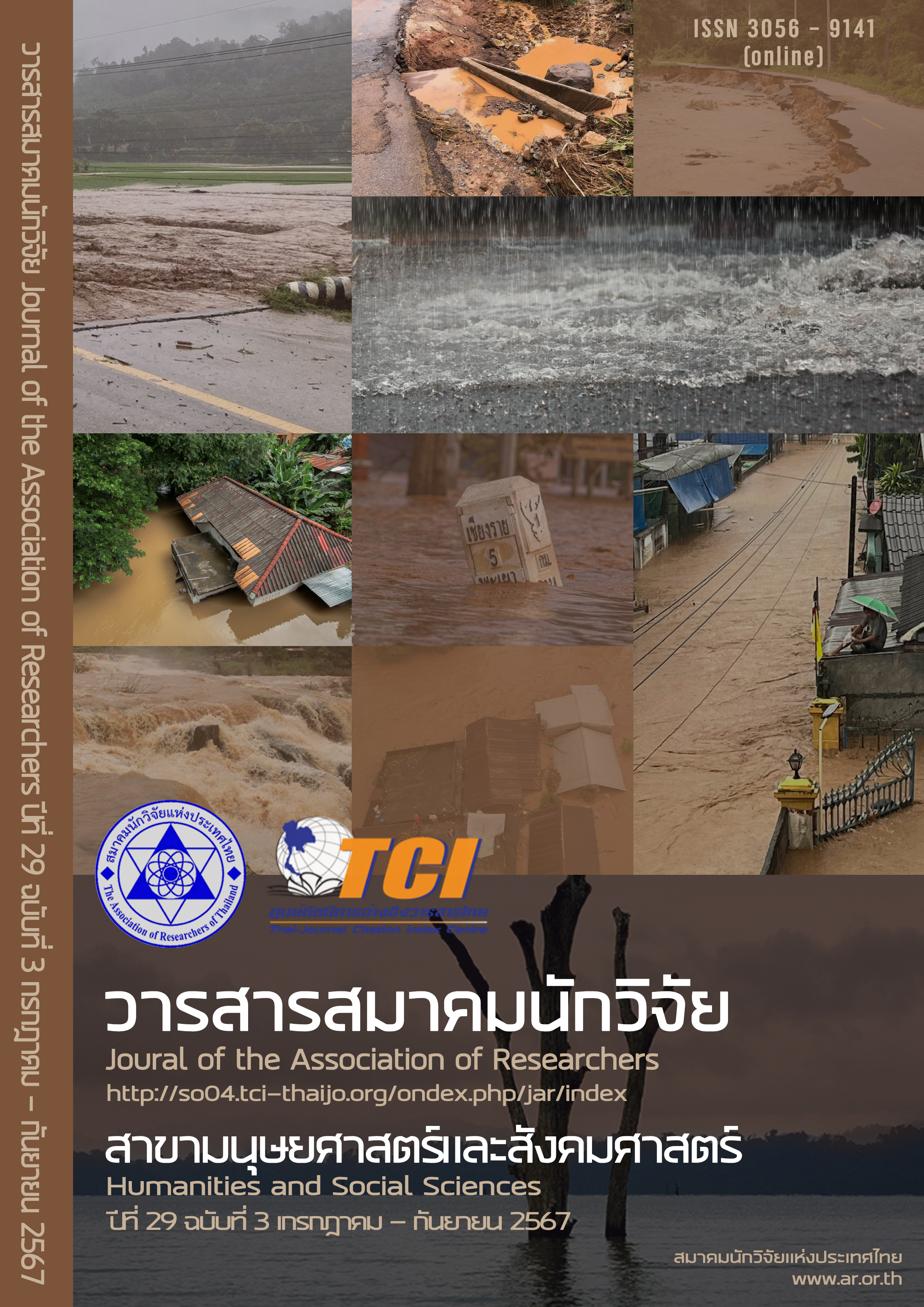The Sustainable Product Attributes of Herbal Product Selected by Consumers in Bangkok Metropolitan
Main Article Content
Abstract
The objectives of this research study were to 1) study the relationship between demographic factors and sustainable product attribute of herbal products among consumers in Bangkok and 2) study the relationship between demographic factors and consumer behavior in purchasing herbal products. In Bangkok The target group is consumers who purchase herbal products. Living in Bangkok, a total of 450 people, the sample size was determined using Cochran's formula and convenience sampling was done, which collected data using questionnaires via an online system. This research study used a questionnaire as a research tool. Analyzed with descriptive statistics including frequency distribution, percentage, mean, and standard deviation. One-way analysis of variance and Independent Sample t-test were used to test hypotheses. The majority of the sample were female, aged between 31–40 years, single, had a bachelor's degree or equivalent, and were employed as employees/private company employees. and had an average monthly income between 20,001 - 30,000 baht. The research results found that the sample group had a habit of purchasing herbal products. Most choose to buy herbal products because they feel they are safe to use. Choosing to buy through pharmacies and behavior in choosing herbal products Most of the sample were people who had previously used herbal products by selecting them from drug stores/pharmacists as recommended. The results of the one-way analysis of variance of demographic factors affecting product attribute of sustainable products of herbal products found that the factors Age demographics Different educational levels, occupations, and average monthly incomes The level of importance given to sustainable product attribute of herbal products was given at a statistical significance of 0.05
Article Details

This work is licensed under a Creative Commons Attribution-NonCommercial-NoDerivatives 4.0 International License.
บทความที่ปรากฏในวารสารนี้ เป็นความรับผิดชอบของผู้เขียน ซึ่งสมาคมนักวิจัยไม่จำเป็นต้องเห็นด้วยเสมอไป การนำเสนอผลงานวิจัยและบทความในวารสารนี้ไปเผยแพร่สามารถกระทำได้ โดยระบุแหล่งอ้างอิงจาก "วารสารสมาคมนักวิจัย"
References
ฉัตรชัย อินทสังข์ ณพรรณ สินธุศิริ และ ยุพาภรณ์ ชัยเสนา. (2563). ผลิตภัณฑ์เพื่อสิ่งแวดล้อมและการรับรู้คุณค่าด้านสิ่งแวดล้อมที่มีอิทธิพลต่อความตั้งใจซื้อ. WMS Journal of Management Walailak University, 9, 3 (กรกฎาคม-กันยายน): 31-41
ธมนวรรณ โชติวิทะกุล. (2563). ทัศนคติและการตัดสินใจซื้อที่มีต่อกิจการเพื่อสังคมของคน Generation Y ในกรุงเทพมหานคร. ปริญญาการจัดการมหาบัณฑิต,มหาวิทยาลัยมหิดล.
บริษัท ขาวละออเภสัช จํากัด. (มปพ). เกี่ยวกับขาวละออ. เข้าถึงได้จาก https://www.khaolaor. com/aboutus.
บริษัท อ้วยอันโอสถ จำกัด. (มปพ). เกี่ยวกับอ้วยอัน. เข้าถึงได้จาก http://www.ouayun.com/about/.
นิภาพร รุ่งสว่าง. (2551). ทัศนคติและแนวโน้มพฤติกรรมการตัดสินใจซื้อผลิตภัณฑ์อาหารที่มีส่วนผสมของคลอลาเจน. สารนิพนธ์ บธ.ม. (การตลาด). กรุงเทพฯ: บัณฑิตวิทยาลัย, มหาวิทยาลัย ศรีนครินทร วิโรฒ.
ณัฐดนัย โฆสิตาภา. (2566). การใช้ยาสมุนไพรในบัญชียาหลักแห่งชาติ. เข้าถึงได้จาก http://www.rbpho.moph.go.th/upload-file/doc/files/24082023-100706-6596.pdf.
มัลลิกา รัศมีศรีตระกูล และ พีรภาว์ ทวีสุข. (2563). อิทธิพลของทัศนคติที่มีต่อกระบวนการตัดสินใจซื้อบรรจุภัณฑ์ที่เป็นมิตรกับสิ่งแวดล้อมในเขตจตุจักร กรุงเทพมหานคร. บริหารธุรกิจมหาบัณฑิตย์,สถาบันการจัดการปัญญาภิวัฒน์
มูลนิธิโรงพยาบาลเจ้าพระยาอภัยภูเบศร. (มปพ). ความเป็นมาเกี่ยวกับมูลนิธิโรงพยาบาลเจ้าพระยาอภัย ภูเบศร. เข้าถึงได้จาก https://www.thaifstt.org/index2/index.php
ศูนย์วิจัยกสิกรไทย. (2563). เทรนด์ดูแลสุขภาพโดยวิถีธรรมชาติ. เข้าถึงได้จาก https://www.kasikornresearch.com/InfoGraphic/Documents/HERB-2020.pdf.
สิริพัฒนัญ ชินเศรษฐพงศ์. (2561). ปัจจัยที่ส่งผลต่อการตัดสินใจซื้อสินค้าที่เป็นมิตรต่อสิ่งแวดล้อมของผู้บริโภค. บริหารธุรกิจมหาบัณฑิต,มหาวิทยาลัยธรรมศาสตร์.
อดุลย์ จาตุรงคกุล และดลยา จาตุรงคกุล. (2550). พฤติกรรมผู้บริโภค. (พิมพ์ครั้งที่ 2). กรุงเทพฯ :มหาวิทยาลัยธรรมศาสตร์.
Translated Thai References
Adul J.& Dolaya. J. (2007). Consumer behavior. (2nd printing). Bangkok: Thammasat University. (in Thai).
Chao Phraya Abhaibhubejhr Hospital Foundation. (n.d.). Background about the Chao Phraya Abhaibhubejhr Hospital Foundation. Accessible from https://www.thaifstt.org /index2/index.php. (in Thai).
Chatchai, I. et al. (2020). Environmental products and Perceived environmental values that influence purchase intentions. WMS Journal of Management Walailak University, 9, 3 (July-September): 31-41. (in Thai).
Kasikorn Research Center. (2020). Trends in taking care of health through natural methods. Accessible from https://www.kasikornresearch.com/InfoGraphic/Documents/HERB-2020.pdf. (in Thai).
Khaolao Pharmacy Co., Ltd. (n.d.). About Khaolao. Accessible from https://www.khaolaor.com/aboutus
Uay An Osot Co., Ltd. (n.d.). About Uay An. Accessible from http://www.ouayun.com/about/. (in Thai).
Mallika, R & ,Peerapaw., T. (2020). Influence of attitude on the decision-making process for purchasing environmentally friendly packaging in Chatuchak area. Bangkok. Master of Business Administration, Panyapiwat Institute of Management. (in Thai).
Natdanai. K.(2023). Use of herbal medicines in the National List of Essential Medicines. Accessible from http://www.rbpho.moph.go.th/upload-file/doc/files/24082023-100706-6596.pdf. (in Thai).
Nipaporn. R. (2008). Attitudes and behavioral trends in purchasing decision-making food products containing ingredients.Collagen. Thesis: M.B.A. (Marketing). Bangkok: Graduate School, Srinakharinwirot University. (in Thai).
Siripattana, C. (2018). Factors affecting consumers' decision to purchase environmentally friendly products. Master of Business Administration, Thammasat University. (in Thai).
Thamonwan. C. (2020). Attitudes and purchasing decisions towards social enterprises of Generation Y in Bangkok. Master of Management Degree, Mahidol University. (in Thai).


